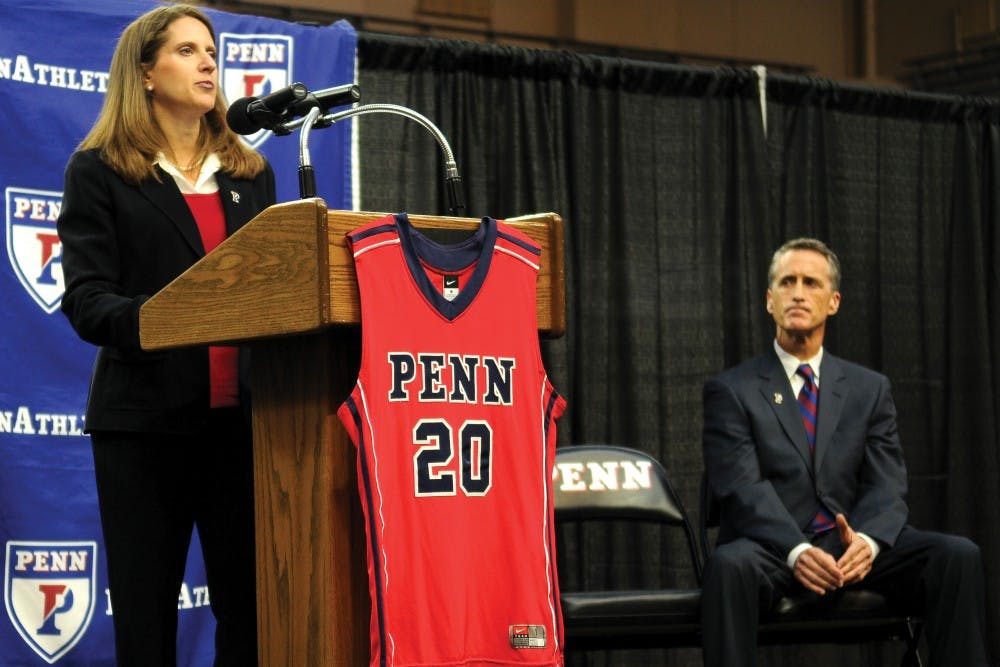
Tuesday marks the one year anniversary of Grace Calhoun’s introduction as Penn’s new athletic director. And eventful is the first word that comes to mind when describing her tenure thus far.
Interestingly enough, the most prominent aspect of Calhoun’s time at Penn to date is not the relative lack of success the University’s teams have had in 2014-15. After the program saw several years of competing for Ivy League titles in football, men’s lacrosse and men’s soccer — to name a few sports — Calhoun has only one conference championship to her name since officially replacing former Athletic Director Steve Bilsky last July.
In reality, Calhoun’s teams have mostly made headlines for what has happened outside their respective venues rather than in them.
Since July, four of Penn’s programs — including its two most marquee sports — have undergone coaching changes. While not all of those transitions have unfolded because of decisions made by Calhoun, the fabric of Penn Athletics has shifted significantly in the past 12 months, and the former Loyola athletic director has been forced to confront that new landscape.
One month after her hiring was announced, the first major development of Calhoun’s tenure transpired. Entering his 23rd season at the helm of Penn football, legendary head coach Al Bagnoli announced his retirement, effective in November.
It remains unclear exactly how involved Calhoun was in Bilsky’s selection of then-defensive coordinator Ray Priore as Bagnoli’s successor. Regardless, understanding that it was Bagnoli’s intention to serve Penn Athletics in an administrative fashion, Calhoun followed Bilsky’s plan, eventually creating the position of Director of Special Projects for Bagnoli.
Fast forward eight months, and Bagnoli is long gone. Not only is the nine-time Ivy champ no longer patrolling the sidelines of Franklin Field, he has left Penn completely, returning to coaching in February at Columbia after a period he equated to a “three-month sabbatical.”
It’s not surprising that the egos of a decorated winner and the ultimate athletic authority at Penn could not coexist. While Bagnoli told me that he kept the athletic director “in the loop” as he began negotiations with Columbia, his stunning departure is one that has left a deep impression on Calhoun’s first year.
The shadow cast on Franklin Field by Bagnoli’s position within Penn Athletics was going to be prevalent no matter what happens in the 2015 season. Now, with the legend in New York, that specter has become even larger.
Like Bagnoli’s exit, the resignation of women’s soccer coach Darren Ambrose was also a shocker. After 15 years in charge of the Red and Blue, the three-time Ivy champion announced he had taken the same position with Vanderbilt in late January.
Because Ambrose was one of the longest-tenured coaches at the University at the time of his resignation, Calhoun was unexpectedly tasked with finding his replacement on the eve of the firing of men’s basketball coach Jerome Allen. In doing so, the athletic director went back to a familiar well: Stanford.
In hiring Cardinal assistant Nicole Van Dyke as Ambrose’s successor, it marked the second time Calhoun found someone in Palo Alto who fit the mold of what she was looking for in a Penn coach. She hired Stanford assistant Alex Tirapelle to fill the wrestling head coaching vacancy last summer.
Of course, the most important moment of Calhoun’s time at Penn up to now has been her handling of the men’s basketball coaching situation. When she was first hired, Calhoun explained that she would not only spend her first year assessing all of Penn’s programs, but would also pay particular attention to its flagship sport.
“I was very committed to really observing, going through the process for a year to figure out what I liked and what I needed to change,” Calhoun said at new head coach Steve Donahue’s introductory press conference. “Now I’ve got a pretty clear sense of what our organizational structure needs to look like, how we realign our stepping and our priorities ... as a whole to be successful going forward.”
We now know what that change looks like. It’s the dismissal of a legendary player from his coaching position when signs point towards marked improvement moving forward. It’s the hiring of a former Ivy champion — not to mention a former Penn assistant — to fill that void. It’s not getting complacent, continuing to alter the details that need to be fixed within Penn Athletics.
“We’ve had competitive advantages for a number of years,” Calhoun said. “But it’s clear that thinking about how we fund the program, what type of schedule we build, what types of trips we take, all of the support pieces around the program like strength and conditioning, athletic training, sports and nutrition — we have to rethink how we do all of that.”
After all, if you’re a fan of “House of Cards” or — more appropriately — Winston Churchill, you know that “to improve is to change. To perfect is to change often.”
For one year, Calhoun’s tenure has been eventful. It’s also been full of change. She oversaw six coaching transitions in three years at Loyola. If you’re keeping score, that’s four in 12 months while at Penn.
While the changes may seem like the reactionary decisions of someone in a new environment, think again. As Calhoun implied after Donahue’s introduction, that hiring — and the three transitions before it — are only the beginning.
When Calhoun was hired last March, my colleague said “Welcome to the Calhoun era of Penn Athletics.”
If that wasn’t true then, it most certainly is now. One year in, there’s no question that Steve Bilsky is gone, and this is officially Grace Calhoun’s domain.
The Daily Pennsylvanian is an independent, student-run newspaper. Please consider making a donation to support the coverage that shapes the University. Your generosity ensures a future of strong journalism at Penn.
DonatePlease note All comments are eligible for publication in The Daily Pennsylvanian.







